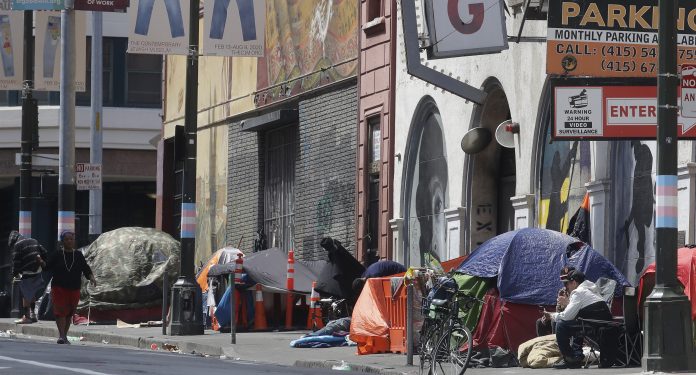(Bethany Blankley, The Center Square) The Department of Homelessness and Supportive Housing has requested an additional $20 million from the city of San Francisco to keep six Safe Sleeping Village encampments running for another two years.
The encampments are comprised of tents spaced six feet apart on concrete within a white painted square box on the ground. The encampment is enclosed by portable barriers where along one wall are air-conditioned trailers with showers and portable toilets.
The funding request comes after the city spent $18.2 million to fund 260 tents on six sites, costing taxpayers $60,000 per tent per year. Little-to-none of the money has gone to find permanent housing or toward finding a long-term alternative.
Funding for the six encampments pays for the costs of the tents, providing three meals a day, 24-hour security and maintaining bathrooms and showers.
The department is asking the city to allocate an additional $15 million for the upcoming fiscal year for a similar number of tents, costing taxpayers roughly $57,000 per tent per year.
The sites were created in May 2020, two months into the state’s lockdown, as a way to keep homeless individuals off of the sidewalks.
At a recent meeting, Supervisor Ahsha Safai questioned the $20 million request, suggesting it was an exorbitant amount to continue to fund what was supposed to be a temporary solution.
Supervisor Hillary Ronen said the cost “just doesn’t make any sense.”
Proposition C, a 2018 business tax passed by voters to collect money for homeless services, funds the program, which within another two years will have cost taxpayers $1 billion.
In May 2020, Jonathan Streeter, a city spokesperson, told the San Francisco Examiner that the encampments were a temporary approach and the areas where they were located would be returned to their prior uses once the governor’s shelter in place order was lifted, and the city would continue to work on long-term, safe solutions for the homeless.
The villages parallel a failed venture the city entered into with hotels to house the homeless. A report published in City Journal describes the city’s Front-Line Worker Housing hotels: officials funded nearly $4,000 worth of alcohol for homeless in one purchase, chaos is erupting inside and around the hotels, and hotel workers are forbidden from discussing what they witness, or face a $1,000 fine or imprisonment of up to one year or both.
“The hotels were pressured into accepting the homeless guests, though they were also eager for the chance to recoup some revenue lost to the Covid-19 lockdowns,” it reports. “Rooms are rented at close to $200 per night, totaling $6,000 a month – nearly double the cost of a private one-bedroom apartment in San Francisco. The city-sponsored guests also receive personal grooming, sanitary, and cleaning supplies, three delivered meals, and laundry service for clothes and linens. Contracts last between 90 days and two years; by that point, the guests may be able to claim de facto permanent residence.
“Eventually, at least some of these properties will revert to being real hotels again, and homeless guests will check out. If the city has an exit plan for what happens next, though, officials aren’t sharing it.”
Despite receiving federal coronavirus relief money, the city is facing a projected $650 million budget deficit over the next two years…Original Source…

